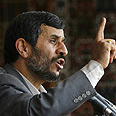
Iran said on Thursday it was ready to negotiate over a new package of economic incentives put forward by major powers seeking to persuade Tehran to curb its nuclear work.
Iranian Foreign Minister Manouchehr Mottaki told a news conference in the Ugandan capital Kampala that the six – the United States, Russia, China, Britain, France and Germany –should also take a serious look at Tehran's own proposals.
"We have informed them of our readiness to negotiate. The package given by the P5+1 countries is currently under consideration and at the appropriate time Teheran will give its reactions," Mottaki said.
On Wednesday, a US Senate panel approved legislation to strengthen US sanctions on Iran, in an effort to get that country to drop its nuclear program.
The Senate Finance Committee cleared the bill to expand trade and financial sanctions 19-2, and the House of Representatives passed similar legislation last year.
Washington believes Iran harbors ambitions to build an atomic bomb, while Tehran says its nuclear program is for peaceful energy purposes.
The measure would strengthen existing US sanctions by tightening the trade ban on goods to and from Iran. For example, it would no longer allow the import of Iranian carpets, caviar, and nuts to the United States.
Extended financial sanctions
The bill also would expand financial sanctions on some Iranian individuals, and penalize US companies if their foreign subsidiaries do business with Iran.
In provisions likely to displease the White House, both the House and Senate bills also would press Russia to stop helping Iran's nuclear program by barring the United States from entering into a civilian nuclear agreement with Moscow until that country suspends such assistance.
While President George W. Bush favors tougher international sanctions on Iran, he also wants the civilian nuclear accord with Moscow. Bush, along with many lawmakers, initially criticized Russia for delivering nuclear fuel to Iran. But he has recently taken the position that such a move shows Russia can be a dependable s
upplier so that Iran itself has no need to enrich uranium.
The way forward for Iran sanctions legislation in Congress also is unclear because at least one other proposal is pending in another Senate committee.
"The strong sanctions we've approved today will work to deter the Iranian government from producing a nuclear weapon," said the committee's chairman, Sen. Max Baucus, a Montana Democrat who earlier this week recast the measure based on a bill from Oregon Republican Sen. Gordon Smith.















